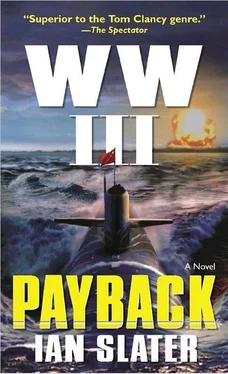And so, by the time General Douglas Freeman and his eight fellow “nonactive” list team members were en route on their black-ops Payback mission, the defiant but ever-cautious, hardworking Omura, the “quiet old guy” who had built up a chain of teriyaki/rice and sushi stalls throughout the islands after the war and who, in his quietude, didn’t seem to bear any residual animosity against America for its treatment of Japanese-American immigrants during the war, had developed one of the most sophisticated North Korean espionage rings in the United States.
Following what the international media were calling a “terrorist” attack in America against the three airliners, North Korean Intelligence HQ in Pyongyang issued a red alert to its agents throughout the world. Omura’s network was specifically ordered to watch for any unusual U.S. military activity in Hawaii, as it was the most likely stopover and refueling base for any U.S. SpecOps “Asian target” mission launched from America’s West Coast — the big U.S. base in Yokohama the most likely springboard after Hawaii.
Omura’s espionage ring went into high gear. One of his agents, a worker at the huge military airbase adjacent to Honolulu’s civilian airport, saw a huge plane land that same evening. With his folding NVG zoom-lens video camera he got a shot of nine men plus the pilot and air crew who alighted from the huge cavernous jungle-green/khaki aircraft. Ten minutes later Omura’s agent was able to take infrared stills of the loading of what he estimated was a sixty-to seventy-foot-long fuselage with six wheels, two at either end and two in the middle. It was encased in U.S. Army khaki all-weather wrap and had three equally spaced bumps, like engine blocks, along the top, the wrap, it occurred to Omura’s agent, the same kind in which the Americans had transported aircraft and helicopters from Hawaii to Camrahn Bay during the Vietnam War. But he reported that he could see no rotor blades attached, assuming these, as was usual during transport, had been bundled inside the huge Galaxy.
Pyongyang (North Korean Intelligence HQ)
“Sometimes,” colonel Kim said, upon receiving the coded e-mail message, “the Americans wrap the rotors separately from the main body of the helicopter like a collapsed beach umbrella. Unfortunately our agent’s NVG camera’s angle has obviously not penetrated deeper into the plane’s interior.”
“It looks to me, Comrade Colonel,” suggested his second in command, Major Park, “that it is a helo. One of the three bumps, the middle one, is the engine, the other two being rotor mounts, one forward, the other to the rear.”
“Like their original Chinook,” said Colonel Kim, “only a smaller, faster lift helo.”
The colonel thought hard, his dour grimace born of the ruthless competition for promotion in a country that prided itself in being the last true Communist stronghold in a capitalist-corrupted world. He looked again at Omura’s spy’s report. In his mind’s eye Colonel Kim was going over the various types of U.S. helos, trying to discern what kind of load the American Special Forces could be carrying. One of the men in the infrared stills, Omura’s message informed him, was definitely the legendary Freeman who, Kim remembered, had made a name for himself against the Siberian Sixth Armored. But he was retired, wasn’t he? And what heavy load was the helo, if it was a helo, trying to deliver? And where? Surely the American marauder Freeman — if he was planning an attack on North Korea — must realize what folly it would be to enter North Korean airspace with any kind of helo. Even if Freeman was daring enough to fly NOE, nap of the earth, under the radar screen, he would first be picked up by North Korean coastal radar as he flew in from Japan or Okinawa farther to the south.
“Special weapons?” suggested Major Park. “To attack the heavily defended depot at Kosong?”
“Are you sure,” put in Lieutenant Rhee of Coastal Defense Unit 5, “the Americans’ target is Kosong? Perhaps they are only going as far as Japan?”
Colonel Kim and Major Park looked at their unusually tall subaltern. A young officer’s initiative was encouraged up to a point in the Dear Leader’s million-man army, as in any other military, but stupidity wasn’t.
“Where else could the gangster American and his team of thugs be headed for?” asked Colonel Kim.
The earnest young officer, Lieutenant Rhee of the North Korean Army’s East Coast Defense Command, quickly apologized for his presumptuousness, but the fact was that he had more on-the-ground experience than either Colonel Kim or Major Park along the rugged east coast, where the beautiful and massive Taebek range stood as a mighty bastion against the East Sea and Japan 475 miles away. It had been Japan from which the hated Americans had come to aid the detested South in what North Korea had taught its people had been a reactionary capitalist war waged by the United States and its running-dog lackey, South Korea, against the paradisiacal North. By now, this blatant distortion of history was accepted as inviolable fact by several generations of North Koreans, despite them having gone through such devastating famines in the 1990s and early 2000s that starvation rations had killed thousands and literally dwarfed an entire generation.
It was because of these famines that Lieutenant Rhee, at five feet ten, stood out as among the tallest of his generation, from which Pyongyang had had to struggle to get any North Korean soldiers who could hold their own standing next to the six-and-a-half-foot American giants who manned the DMZ with such impressive physical presence. But the North Korean Army, along with their Dear Leader and his cabal in Pyongyang, were the best fed in a country whose Communist leadership under the Dear Leader had poured all it possibly could into its armed forces. As such, the army of which Lieutenant Rhee of North Korea’s Coastal Defense Command was an ardent member came closer to the clichéd “lean and mean” ideal than most professional armies. The meanness was the result of a carefully maintained paranoid cradle-to-grave indoctrination of hatred against America and its “running-dog lackeys,” the latter a Communist propaganda expression so old and outworn that other Communist regimes no longer bothered to use it.
It was used again in May 2004 after a train on April 22 carrying ammonia nitrate fertilizer through Ryongchon near the Chinese — North Korean border struck an oil tanker train, which brought down a live power cable, causing a massive explosion that leveled large sections of Ryongchon and killed or wounded over two thousand, most of them children. For the first time in more than thirty years, the Hermit Kingdom requested outside aid, but any coming from the running-dog lackeys of America or South Korea had to be rerouted by sea so that the North Koreans would not think the U.S. or any of its “lackeys” were involved in the aid effort.
For Rhee, the daily propaganda had nurtured a continual sense of vigilance, increased by the undeniable geographic fact of the ruggedness of Korea’s east coast. He could think of few other coastlines that were so ideal for covert landings of special forces by North Korea’s enemies.
On the other side of the world, in the Galaxy’s huge redded-out interior, Douglas Freeman and his eight-man SpecOp team could feel the change in the deep, throbbing timbre of the Galaxy’s four big engines as the giant transport began its glide path from 33,000 feet over the cobalt blue of the far western Pacific toward a verdant sliver of land that was the southeastern coast of Japan. It had been a long haul, both the Galaxy’s crew and Freeman’s team glad to see terra firma. As they passed over the Japanese coastline, an immaculate green patchwork of rice fields below, no one was happier than Choir Williams, who hated the avgas smell that permeated transport aircraft. This only added to his general aversion to air travel, which was, contrary to all counterargument, based on his firm belief that bad things happen in threes. In all other matters, Choir’s SpecFor buddies knew him as the epitome of the nonsuperstitious, commonsense soldier, but on this matter of threes, his belief was as unshakeable as Freeman’s conviction, which also amused fellow SpecFor members, that George Washington had indeed stood in the prow of the boat. Those who knew Freeman well, like Aussie Lewis, Salvini, and Choir, saw the general’s belief not so much as evidence of his eccentric nature but as a manifestation of his lifelong commitment to exemplary leadership. It was the type of “on the point” leadership that Washington had exemplified: visible and unafraid, the kind that those who had served under Freeman had come to expect and which, despite his Pattonesque gruffness at times, was the reason that even those who didn’t like him had to grudgingly admire him.
Читать дальше












